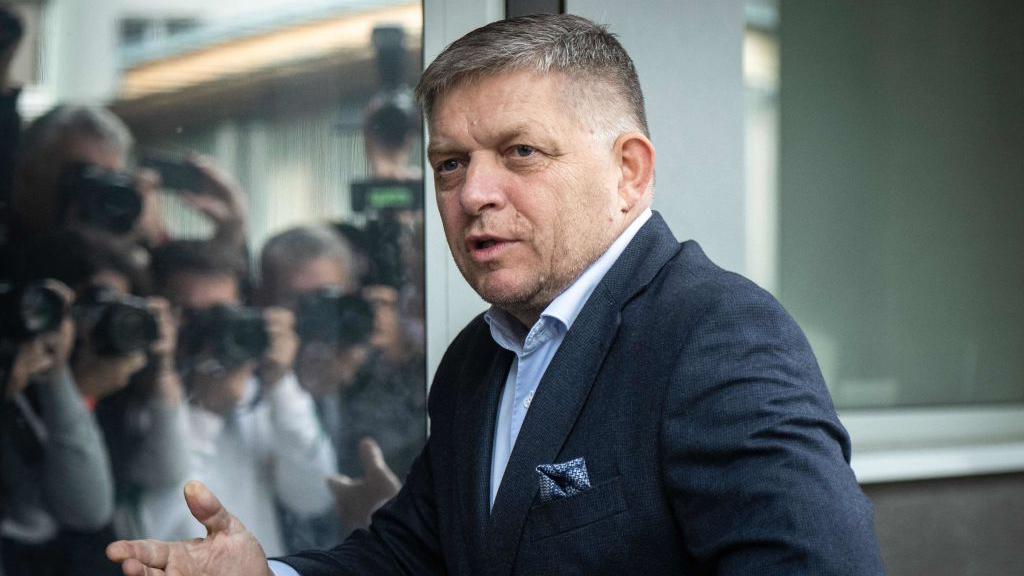What Slovakia's pro-Russia election result means for Ukraine
The victory of former Slovakian Prime Minister Robert Fico's populist Smer party has raised concerns of waning support for Kyiv in Western democracies


A free daily email with the biggest news stories of the day – and the best features from TheWeek.com
You are now subscribed
Your newsletter sign-up was successful
Former Slovakian Prime Minister Robert Fico's populist Smer (Direction) party won a plurality of seats in Slovakia's parliamentary elections on Saturday, according to results released Sunday. Smer earned about 23%, giving it 42 seats in the 150-seat Parliament. A liberal, pro–European Union party, Progressive Slovakia, took second place, with 18% of the votes and 32 seats. In third place was the leftist Hlas (Voice) party, led by former Fico deputy Peter Pelligrini, with nearly 15% and 27 seats.
Fico, 59, ran on a pro-Russia platform that included stopping military aid to Ukraine plus a mixture of "social conservatism, nationalism, anti-LGBTQ rhetoric and promises of generous welfare handouts," The New York Times reported.

In order to return to power, Fico has to form a coalition with at least two other parties. Pelligrini, who broke from Fico after he was forced to step down following the murder of a journalist investigating ties between Fico associates and Italy's mafia, has kept his options open. But analysts said there's a good chance Fico will form a government with Hlas and the ultranationalist, pro-Russia Slovak National Party, whose 10 seats would give Fico a parliamentary majority of 79 seats.
The Week
Escape your echo chamber. Get the facts behind the news, plus analysis from multiple perspectives.

Sign up for The Week's Free Newsletters
From our morning news briefing to a weekly Good News Newsletter, get the best of The Week delivered directly to your inbox.
From our morning news briefing to a weekly Good News Newsletter, get the best of The Week delivered directly to your inbox.
Progressive Slovakia leader Michal Šimečka held out hope that his party could form a government if Fico fails.
Assuming Fico prevails, he could join with Hungary's Russia-friendly populist leader, Viktor Orban, to try and block the E.U.'s staunch support for Ukraine. Slovakia's caretaker government was the first to send Ukraine MiG-29 fighter jets.
But "while a Fico government would represent a shift in Ukraine policy from a neighbor that has led on deliveries of tanks and heavy weapons, analysts say the impact of his threat to cut off arms deliveries could be limited," The Washington Post added. "Fico has specified only that he will stop sending arms from Slovakia's already depleted military stocks. He has refrained from threats to halt supplies from the country's arms manufacturers that stock Ukraine with much-needed artillery shells."
A free daily email with the biggest news stories of the day – and the best features from TheWeek.com
Peter has worked as a news and culture writer and editor at The Week since the site's launch in 2008. He covers politics, world affairs, religion and cultural currents. His journalism career began as a copy editor at a financial newswire and has included editorial positions at The New York Times Magazine, Facts on File, and Oregon State University.
-
 The environmental cost of GLP-1s
The environmental cost of GLP-1sThe explainer Producing the drugs is a dirty process
-
 Greenland’s capital becomes ground zero for the country’s diplomatic straits
Greenland’s capital becomes ground zero for the country’s diplomatic straitsIN THE SPOTLIGHT A flurry of new consular activity in Nuuk shows how important Greenland has become to Europeans’ anxiety about American imperialism
-
 ‘This is something that happens all too often’
‘This is something that happens all too often’Instant Opinion Opinion, comment and editorials of the day
-
 Epstein files topple law CEO, roil UK government
Epstein files topple law CEO, roil UK governmentSpeed Read Peter Mandelson, Britain’s former ambassador to the US, is caught up in the scandal
-
 Iran and US prepare to meet after skirmishes
Iran and US prepare to meet after skirmishesSpeed Read The incident comes amid heightened tensions in the Middle East
-
 Grok in the crosshairs as EU launches deepfake porn probe
Grok in the crosshairs as EU launches deepfake porn probeIN THE SPOTLIGHT The European Union has officially begun investigating Elon Musk’s proprietary AI, as regulators zero in on Grok’s porn problem and its impact continent-wide
-
 Israel retrieves final hostage’s body from Gaza
Israel retrieves final hostage’s body from GazaSpeed Read The 24-year-old police officer was killed during the initial Hamas attack
-
 China’s Xi targets top general in growing purge
China’s Xi targets top general in growing purgeSpeed Read Zhang Youxia is being investigated over ‘grave violations’ of the law
-
 Ukraine, US and Russia: do rare trilateral talks mean peace is possible?
Ukraine, US and Russia: do rare trilateral talks mean peace is possible?Rush to meet signals potential agreement but scepticism of Russian motives remain
-
 Panama and Canada are negotiating over a crucial copper mine
Panama and Canada are negotiating over a crucial copper mineIn the Spotlight Panama is set to make a final decision on the mine this summer
-
 The rise of the spymaster: a ‘tectonic shift’ in Ukraine’s politics
The rise of the spymaster: a ‘tectonic shift’ in Ukraine’s politicsIn the Spotlight President Zelenskyy’s new chief of staff, former head of military intelligence Kyrylo Budanov, is widely viewed as a potential successor
